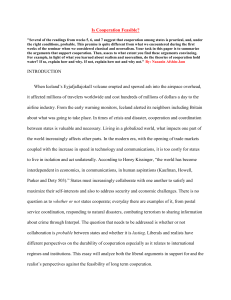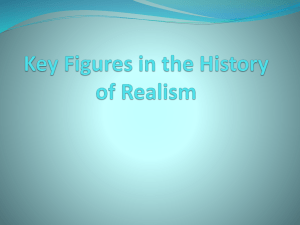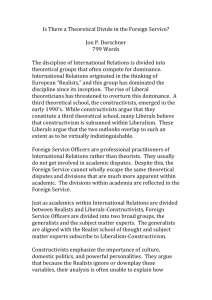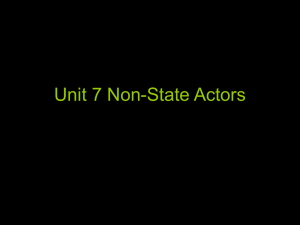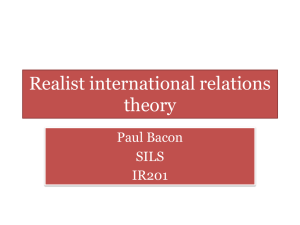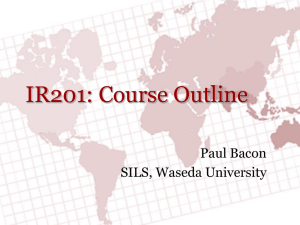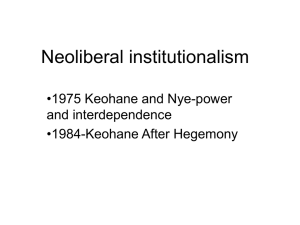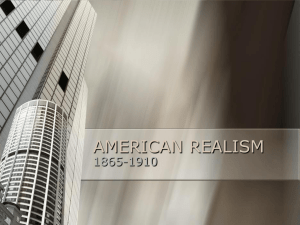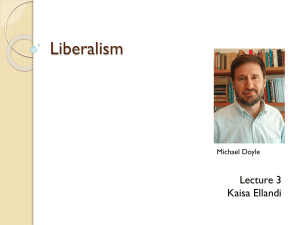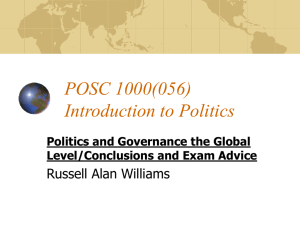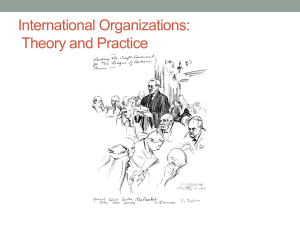Theories in the discipline of International Relations are
advertisement
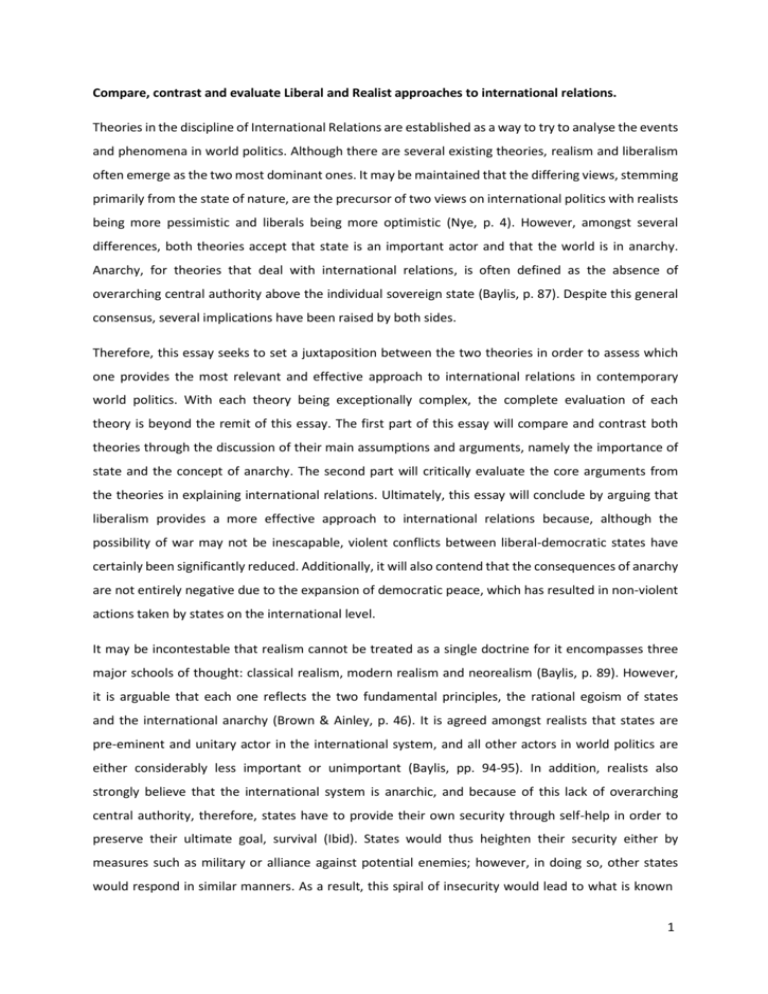
Compare, contrast and evaluate Liberal and Realist approaches to international relations. Theories in the discipline of International Relations are established as a way to try to analyse the events and phenomena in world politics. Although there are several existing theories, realism and liberalism often emerge as the two most dominant ones. It may be maintained that the differing views, stemming primarily from the state of nature, are the precursor of two views on international politics with realists being more pessimistic and liberals being more optimistic (Nye, p. 4). However, amongst several differences, both theories accept that state is an important actor and that the world is in anarchy. Anarchy, for theories that deal with international relations, is often defined as the absence of overarching central authority above the individual sovereign state (Baylis, p. 87). Despite this general consensus, several implications have been raised by both sides. Therefore, this essay seeks to set a juxtaposition between the two theories in order to assess which one provides the most relevant and effective approach to international relations in contemporary world politics. With each theory being exceptionally complex, the complete evaluation of each theory is beyond the remit of this essay. The first part of this essay will compare and contrast both theories through the discussion of their main assumptions and arguments, namely the importance of state and the concept of anarchy. The second part will critically evaluate the core arguments from the theories in explaining international relations. Ultimately, this essay will conclude by arguing that liberalism provides a more effective approach to international relations because, although the possibility of war may not be inescapable, violent conflicts between liberal-democratic states have certainly been significantly reduced. Additionally, it will also contend that the consequences of anarchy are not entirely negative due to the expansion of democratic peace, which has resulted in non-violent actions taken by states on the international level. It may be incontestable that realism cannot be treated as a single doctrine for it encompasses three major schools of thought: classical realism, modern realism and neorealism (Baylis, p. 89). However, it is arguable that each one reflects the two fundamental principles, the rational egoism of states and the international anarchy (Brown & Ainley, p. 46). It is agreed amongst realists that states are pre-eminent and unitary actor in the international system, and all other actors in world politics are either considerably less important or unimportant (Baylis, pp. 94-95). In addition, realists also strongly believe that the international system is anarchic, and because of this lack of overarching central authority, therefore, states have to provide their own security through self-help in order to preserve their ultimate goal, survival (Ibid). States would thus heighten their security either by measures such as military or alliance against potential enemies; however, in doing so, other states would respond in similar manners. As a result, this spiral of insecurity would lead to what is known 1 as the security dilemma, which implies that one state’s security is another state’s insecurity (Ibid). Essentially, this lack of trust would result in an arms race, and, as realists strongly believe, eventually make war inevitable. Despite the seemingly incontrovertible weight of realist’s account, liberals have challenged its core assumptions and arguments. While the importance of states has been acknowledged by liberals, they, however, argue that realists ignore other important actors, such as transnational corporations and international institutions (Jackson & Sorensen, p. 88). Furthermore, although liberals do not deny the significance of military force, contrary to realists, they place greater emphasis on cooperation, interdependence and shared values; and maintain that anarchy can be mitigated by various factors (Ibid, pp. 96-98). It can be argued, from liberals’ perspective, that states are no longer the main and unitary actor in the international politics. In this rapidly changing world, states are inclined to cooperate and engage in transnational relations such as economic interdependence, which would discourage violent conflict since it would be too costly for them to isolate themselves, and would result in damages on both counterparts (Ibid, p. 102). In addition, liberals stress that the shared liberaldemocratic value would direct to peaceful coexistence (Ibid, p. 109). For instance, due to their liberal-democratic constitutions and conjunction in economic affairs, arguably, it is inconceivable that the USA and Canada would go to war (Baylis, p. 104). In this regard, security and survival would not be states’ only goals, arguably, they have more to gain from cooperation and economic welfare. Also, it is essential to grasp that liberals do not claim that liberal-democratic states are any more peaceful. It is, however, highly unlikely that they would go to war against each other due to the shared values, and the mutually beneficial ties of economic cooperation and interdependence. Nonetheless, realists would still remain reluctant to accept liberals’ claims. While they do not disagree that there have been changes, they argue that such changes have not led to the disappearance of anarchy (Jackson & Sorensen, p. 115). It is common to quote Hobbes as realists’ respond to the peaceful coexistence in contemporary society: “Just as stormy weather does not mean perpetual rain, so a state of war does not mean constant war” (Nye, 2007). In other words, no matter how progressive and cooperative the world seems to be, there is no escape from the self- help system, the security dilemma and the structure of a state system. A prominent example for this would be the failure of the League of Nations leading to the outbreak of the Second World War (Jackson & Sorensen, pp. 114-115). In anarchy, it can be argued that international institutions would be ineffective due to the lack of power to punish defectors, and at the end of the day states would still act according to their national interests. Thus, this clearly suggests that the liberal conditions 2 have failed to prevent violent conflicts between states. The prospect of war in an anarchic system is therefore inevitable. On a closer analysis, it is undeniable that conflicts had existed in the twentieth-century, but, arguably, these conflicts have substantiated the reliance of liberal thinking. It may be maintained that without first attempt to create the League of Nations as an international authority, international institutions such as the EU, the IMF and the WTO may not have been successfully implemented. Liberals, unlike realists, stress on the significance of an institution because they believe that it would not only alleviate the lack of trust but also promote greater cooperation between states, making the possibility of war unlikely (Ibid, p. 106). Furthermore, to reiterate an important point, liberals do not contend that anarchy has been substituted by hierarchy. However, they argue instead that the international relations of anarchy are substantially more complex than is recognised by realists. Anarchy means that there is no solitary government, but it does not mean a complete absence of government (Jackson & Sorensen, p. 118). That is to say world politics do not necessarily have to be in the status of a ‘raw anarchy’ that only involves insecurity. France and Germany, for instance, were states that had engaged in wars in the past decade; however, with the creation of the EU, instead of resolving their conflicts militarily, they have agreed to cooperate within a common economic and political structure. Additionally, it can also be argued that state’s sovereignty is weakening because member-states were not forced, but can choose, to join the institution freely (Burchill, p. 66). Nevertheless, realists would dispute that peace does not simply mean the absence of war. It can be argued there are two types of peace. The first type, which is amongst the heavily armed states where the prospect of war is lurking, is relatively secure. The second main type of peace, ‘liberal’ peace, is profoundly more secure. It has been built on a basis of a solid network of international institutions to facilitate cooperation, a considerable degree of economic interdependence and shared liberaldemocratic values (Jackson & Sorensen, 2010, p. 119). Therefore, it would be sensible for liberals to be optimistic about the time ahead because, evidently, genuine progress is not only possible but also taking place in significant regions of the world. On the last note, certainly it is true that there is no world government. However, it may be argued that the world does not seem to be as anarchic as realists claim it to be. In conclusion, it appears to be that realists have understated the importance of non-state actors and overlooked the current and most prevalent trend in the contemporary world, the spread of liberal peace. It could be maintained that their focus on conflicts may have inhibited them from realising the significant changes in the international politics, particularly how states have shifted from resolving their differences with violence to cooperation via an ever-increasing number of 3 international institutions. Arguably, if this trend is continuous, it would illustrate the strength of liberal peaceful coexistence over the realist’s view that war is an endemic feature of international relations. Eventually, in the words of Kant, “Peace can be perpetual” (Burchill, p. 60) Bibliography Baylis, J. (2011). The globalisation of world politics: an introduction to international relations. Oxford: Oxford University Press. Brown, C., & Ainley, K. (2009). Understanding International Relations. Hampshire: Palgrave Macmillan. Burchill, S. (2009). Theories of International Relations. Hampshire: Palgrave Macmillan. Jackson, R., & Sorensen, G. (2010). Introduction to International Relations: Theories and Approaches. Oxford: Oxford University Press. Nye, J. (2007). Understanding International Conflicts: an introduciton to theory and history. London: Pearson. - 4
